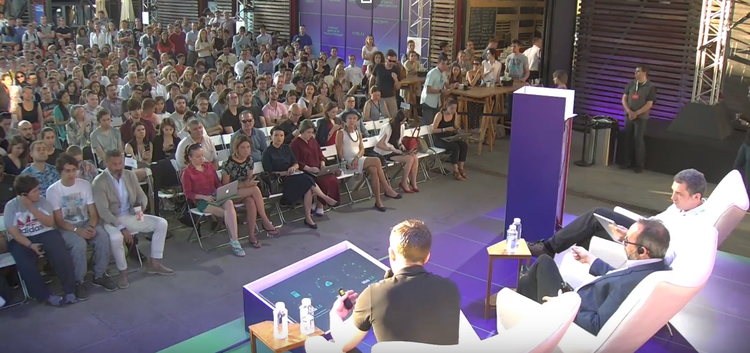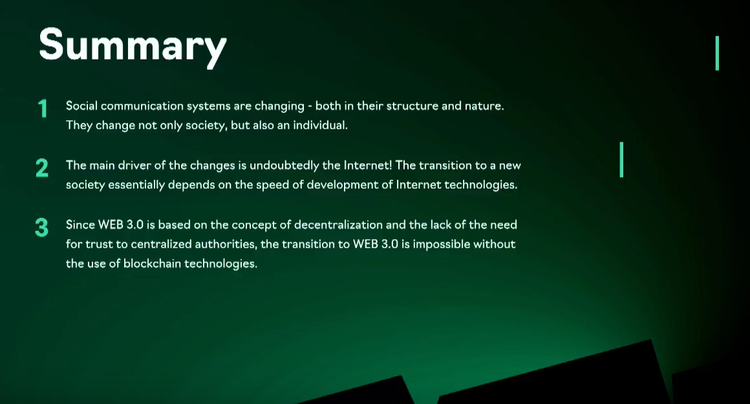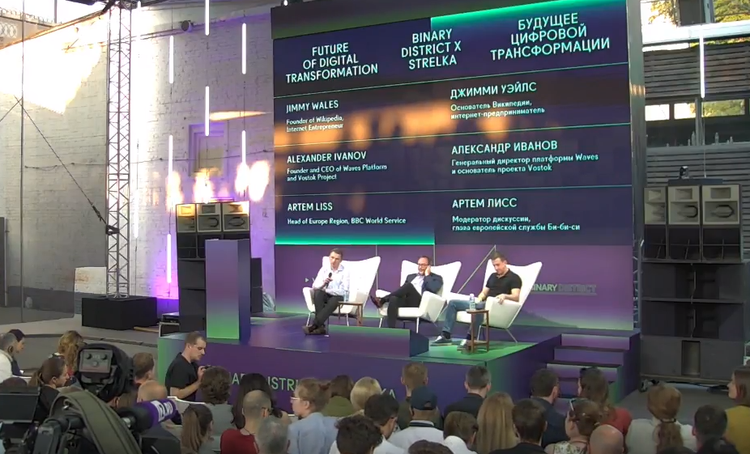‘The Future of Digital Transformation’ discussion held in Moscow on July 12, has truly proved to be a treat for all participants. It was perhaps unsurprising that given the nature of the discussion and the presence of Wikipedia founder Jimmy Wales and Alexander Ivanov, CEO of Waves blockchain platform, the place was packed.
But a fine summer's eve proved to be a challenge for the organizers as Capital’s blinding sunset concentrated its shining efforts right onto that specific part of the stage where the speakers were supposed to sit. BBC’s Europe’s regional head Artem Liss has opened the session by jokingly dismissing that the sun was the reason behind a small delay. But hey when did anything stand in the way of human progress, or a discussion of it, right?
The crowd was excited, you could tell, as every single available seat in at least the front five rows was taken, luckily enough I arrived an hour in advance and was able to squeeze myself into one of those prized rows.
On to the summary of the discussion:
First. Alexander Ivanov spoke of how everything changed with the arrival of internet, suggesting that the world has increasingly become an interconnected place. The main idea centered around setting up a series of new protocols for social interactions. To Illustrate Alexander has prepared a slide breaking down the three generations of internet. According to him, web 2.0 stage at which we are right now, is controlled by web corporations and can be easily manipulated, but most importantly it’s some way off the decentralized ideas upon which web 1.0 was initially created.
According to him: “The only element missing from web 3.0 is decentralization or as we know it blockchain ... it is the 5th element that will allow us to move back to the ideas upon which Web 1.0 was built.”
The next logical step according to Waves founder would be a transfer beyond the web 2.0, where we could see the society moving beyond traditional governments into a fully decentralized system with the aid of technology.
“After 3.0 we will move to a digital society, replacing social consensus with a technical one.
It will minimize corruption as there will be a protocol of action that would set up and enact laws that will be followed by default, in the same way as our world was presented with the laws of physics in the first place.”
And the way to facilitate that process according to him is through mass tokenization; “We can tokenize absolutely anything ... it’s cheap and no regulator is needed.”
Following that, Jimmy Wales took up the microphone to argue that although digital transformation has somewhat speed up in recent years, it may not be welcomed by all.
According to him, autonomous vehicles, for example, will mean that “millions of jobs are going to disappear very quickly and then we will have all of those people whose job has been driving a truck, and they suddenly would not have that job anymore. ... They may not be happy and they are going to vote for things that may not actually solve their problems, because their problems are much more fundamentally long term about the changes that are coming from technology, and not about this or that policy of today.”
Also when addressing a point raised by Alexander, Jimmy said that he was a little skeptical of replacing social consensus with a technical one as “its human beings that have to make these decisions, and we have to come to some consensus around technology and around what will happen in the future, otherwise we are gonna see a lot of, really quiet dangerous politics come up.”
He also added that the internet is a unifying field where everyone can have equal access and say, and in so, go beyond the notions of hate to realise that “we are all human beings on a planet”.
During a discussion with the audience that followed Alexander was questioned on the notion of a consensus move to which he has admitted that: “You do need some kind of centralization, centralized will, which is going to implement some changes” while saying that the transformation may take a while.
Jimmy then stepped in to clarify his previous scepticism of Alexander’s position by saying that “its very easy to design a protocol or a system that is quite brittle and doesn't actually have flexibility needed to resolve problems”. He also went on to say that it's hard to imagine how a decision to switch to a technical consensus would look like since it may need an unlikely totalitarian state to impose the change. The only alternative would be an open dialogue between people which could be hindered by politicians that know little about decentralized systems which may cause them to propose solutions that don't solve actual problems.
The discussion has however finished on a similar note to the one it began with, the sunset. After Alexander concluded by saying that we will be amazed by future achievements of the humankind much like people from the 17th century would be astonished by what we have now, Jimmy stepped in to say that much like our admiration for the sun in the evening, people have not changed drastically but nevertheless will prevail.
Editorial Overview





